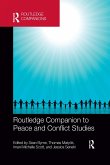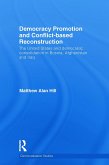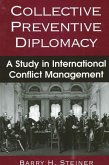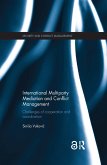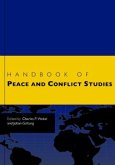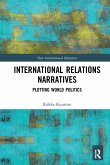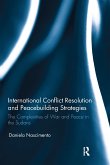This book asks scholars to reexamine international conflict and its management in order to move the field toward directly theorizing about and examining the interdependence between conflict events and conflict management attempts.
Despite decades of work, research on international conflict and its management remains siloed in three fundamental ways. First, scholars do not thoroughly address international conflict dynamics within studies of conflict management, even though the former give rise to the latter. Second, existing work generally investigates one conflict management strategy (e.g., mediation) at the expense of others (e.g., adjudication). These strategies, however, are not independent of one another; they exist on a single menu from which potential third parties choose. Third parties therefore implicitly if not explicitly consider and select among the various strategies when deciding how to manage a conflict, thereby inviting and incorporating comparisons. Finally, researchers tend to treat conflict management efforts even within the same conflict as independent events, even though some efforts (e.g., adjudication or arbitration) follow and explicitly relate to other, earlier efforts (e.g., an earlier negotiation or mediation). In short, elements of sequencing and interaction influence conflict management, even as scholars rarely consider such elements.
This book will be of great value to scholars and researchers of Political Science, International Relations and Conflict Management and Resolution. The chapters in this book were originally published as a special issue of International Interactions.
Despite decades of work, research on international conflict and its management remains siloed in three fundamental ways. First, scholars do not thoroughly address international conflict dynamics within studies of conflict management, even though the former give rise to the latter. Second, existing work generally investigates one conflict management strategy (e.g., mediation) at the expense of others (e.g., adjudication). These strategies, however, are not independent of one another; they exist on a single menu from which potential third parties choose. Third parties therefore implicitly if not explicitly consider and select among the various strategies when deciding how to manage a conflict, thereby inviting and incorporating comparisons. Finally, researchers tend to treat conflict management efforts even within the same conflict as independent events, even though some efforts (e.g., adjudication or arbitration) follow and explicitly relate to other, earlier efforts (e.g., an earlier negotiation or mediation). In short, elements of sequencing and interaction influence conflict management, even as scholars rarely consider such elements.
This book will be of great value to scholars and researchers of Political Science, International Relations and Conflict Management and Resolution. The chapters in this book were originally published as a special issue of International Interactions.


